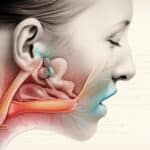The Ringing Ear Sound Effect Unveiled: Tinnitus, Technology, and the Tunes of Cinema
- Get link
- X
- Other Apps
Introduction
Picture this: You’re diving into a warm, peaceful sleep only to be nudged awake by a subtle but persistent ringing in your ears. Sounds familiar? You’ve just experienced an ‘ear ringing’ more technically known as tinnitus. A common yet intriguing phenomenon that has puzzled scientists and audiologists alike for decades. What causes it? How is it experienced differently among individuals? Is there a cure? We aim to explore all these facets in this article.
An In-depth Look at Ear Ringing
So, let’s start at the very beginning. What really causes ear ringing or tinnitus? According to What Causes Ear Tinnitus by Pulsatile Tinnitus Treatments, triggers range from exposure to loud noise, damage to the inner ear, or even simple things like a buildup of earwax or a sinus infection. Age can also often play a factor in tinnitus as certain changes in our hearing ability can predispose us to this condition. However, it’s important to remember that tinnitus isn’t a condition itself. It’s actually a symptom of an underlying condition such as an ear infection, high blood pressure, or even stress and fatigue.
Is it Ear Ringing or Tinnitus?
Now you may be wondering, “Is my ear ringing a symptom of mere fatigue or is it tinnitus?” This question quite often plagues the minds of many who’ve experienced this noise. According to Is My Ear Ringing, if your ear ringing is persistent, affects your daily activities, or is accompanied by other symptoms like hearing loss or dizziness, it could be a sign of tinnitus and may need to be evaluated by a specialist.
Reasons and Causes for Tinnitus
Moving on, let’s delve a little deeper into the specific reasons causing this ear ringing. Exploring Reasons for Ear Ringing, we find a myriad of potential triggers. For some individuals, allergies or sinus congestion can augment the intensity of their tinnitus symptoms. Migraines also have been known to temporarily increase the effects of tinnitus. On the severer side of the spectrum, Eustachian tube dysfunction – a condition that affects your ability to equalize ear pressure – can lead to tinnitus. Depression, anxiety, or stress can also exacerbate this condition, forming a vicious cycle of stress and ringing noises.
Given this knowledge, it’s quite apparent that modifying certain lifestyle habits and managing stress levels can often help in managing tinnitus symptoms. Ultimately, remember to reach out to an audiologist or otolaryngologist if your symptoms persist, and lean on resources like AAO-HNSF for further guidance. So here’s to healthy ears and a sound mind, until the next one!
Triggers: When Tinnitus Attacks
You know what it feels like You’re enjoying a peaceful moment, and suddenly, a peculiar ringing noise invades your ear. That’s tinnitus, popping in uninvited, but have you ever wondered what sets off these unwelcome attacks? Well, a range of conditions could trigger these episodes. For instance, a sudden increase in blood pressure, high caffeine intake, or exposure to loud noises can aggravate tinnitus, leading to an increase in the ear-ringing sound. On the other hand, conditions that cause tinnitus could range from ear conditions, and neurological disorders to metabolic diseases. Moreover, intermittent tinnitus causes spotlights the fact that certain medications might even stimulate these episodes.
Sound Variations: Understanding the Tinnitus Spectrum
‘One man’s cicada is another man’s ringing’ – yes, tinnitus can manifest in a myriad of sound variations. It’s not just about the standard ‘ringing.’ People have reported various sounds, spanning from humming, hissing, buzzing, whistling, and clicking, to even roaring! Interestingly, some folks have described their tinnitus experience as similar to crickets chirping. Is the cicada reference making sense now? Yes, tinnitus sounds like cicadas, and it’s being used as sound therapy to refocus the attention from the tinnitus sound and alleviate the subjective discomfort!
Creating the Ringing Ear Sound Effect
Out of exploration or necessity, if you’ve been searching for a way to create or even mimic the ringing ear sound, there are ways to do that, thanks to technology. Software tools and sound effect libraries available online might be your go-to. You might find a series of different sounds to play around with, and guess what, the ear-ringing sound effect download is available too! Simulating these sounds can help raise awareness about the condition or even aid in creating realistic scenarios in media!
Role of Tinnitus in Movies and Music
Speaking of media, are you aware that the ringing ear sound effect isn’t just a phenomenon confined within the realms of the human ear? Let’s take a detour to a bit more fun discussion. It plays a significant role in films and music. Filmmakers cleverly incorporate these sound effects to symbolize a character’s isolation, disorientation, or aftermath of a traumatic event. It’s an effective tool to create suspense or depict the internal turmoil of a character. In music, bands have used this to create a unique listening experience for their audience, giving them a taste of tinnitus in a melodramatic frame. Through persistent research from bodies like the HHF, these audial experiences can amplify understanding of tinnitus across various platforms.
The Psychology Behind Tinnitus
Stepping into the psychological realm of tinnitus, it’s interesting to note how this condition interacts with mental health. A persistent sound that interrupts your train of thought or nightly peace can undoubtedly cause distress, leading to anxiety or depression. Conversely, these mental health conditions can also exacerbate the perceived loudness or annoyance of tinnitus, creating a vicious cycle. Cognitive therapy can be a lifesaver here, helping individuals reduce their reaction to the onset of tinnitus, thereby improving overall well-being. Resources like the american tinnitus association provide invaluable information and support to individuals grappling with this condition.
Prevention and Management of Tinnitus
Despite its enigmatic nature, managing and preventing tinnitus is no herculean task. Stepping up your ear care game can go a long way! Committing to practices such as avoiding loud noise, protecting your ears while swimming, regularly cleaning your ears, and keeping your blood pressure and stress levels under control can help prevent tinnitus onset.
What if you’re already experiencing ear ringing? Fear not! Treatments are available to provide relief. A common over-the-counter remedy mentioned by Pulsatile Tinnitus Treatments is a lipo-flavonoid supplement. But you might be wondering, do lipo-flavonoid ear ringing side effects exist? While these supplements are generally safe, it’s best to consult your health provider before starting any new medication regimen.
Also, did you know that understanding the underlying phenomenon can help manage the condition? This is where resources like Understanding Tinnitus can play a pivotal role, educating you about the condition, the causes, and how to cope with it.
Conclusion
As we wrap up our journey through the labyrinthian world of tinnitus and ear-ringing sound effects, it’s clear that it’s not just “all in your head.” This condition, woven deep into the fabric of auditory neurology, psychology, and personal experiences, affects numerous individuals worldwide.
However, armed with understanding and guided by scientific advancements, we can navigate the noisy echoes of tinnitus, marching toward the serene symphony of sound silence. The role each one of us plays in managing and preventing tinnitus couldn’t be more emphasized. Remember, your ears are in your hands. Treat them with care, and when in doubt, never hesitate to seek help. Pulsatile Tinnitus Treatments, committed to shining a light on this condition, is there by your side, in your journey towards silence.
For further guidance and support, utilize the resources provided by BTA and continue exploring preventive strategies and effective management practices to maintain your quality of hearing and life!
Ringing Ear Sound Effect - Frequently Asked Questions (FAQ)
Ring in the ear, also known as Tinnitus, can be caused by several factors including exposure to loud noise, an ear infection, high blood pressure, or even stress and fatigue. It’s pertinent to note that tinnitus isn’t a condition itself but a symptom of an underlying condition. For a detailed insight, refer to What Causes Ear Tinnitus.
If your ear ringing is persistent, affects your daily activities, or is accompanied by other symptoms like hearing loss or dizziness, it could be a sign of tinnitus and may need to be evaluated by a specialist. For more information, visit Is My Ear Ringing.
Preventive measures like protecting your ears from loud noise, regular ear cleaning, and keeping your blood pressure and stress levels under control can help better manage tinnitus. If symptoms persist, consult a health provider and inquire about treatments available, for instance, lipo-flavonoid supplements as suggested on Lipo-Flavonoid Ear Ringing Side Effects.
Online resources like Pulsatile Tinnitus Treatments provide essential information about tinnitus, its causes, and how to cope with it. You can start by reading Understanding Tinnitus. Organizations like AAO-HNSF, HHF, and BTA also provide resources and support that can greatly help manage the condition.
Occasional ear ringing, often experienced after exposure to loud noises or during moments of extreme silence, is a temporary phenomenon that many people encounter. It usually fades away after a short period and doesn’t interfere with daily activities. On the other hand, tinnitus is a persistent ringing, buzzing, or humming in the ears that can last for extended periods. It can be continuous or intermittent and might affect one’s daily life, sleep, and mental well-being. If you experience persistent ear ringing, it’s essential to consult an audiologist or otolaryngologist to determine if it’s tinnitus and to explore potential treatments or management strategies.
The post The Ringing Ear Sound Effect Unveiled: Tinnitus, Technology, and the Tunes of Cinema appeared first on Pulsatile Tinnitus Treatments News - Tinnitus Relief.
Related posts:
https://ift.tt/RLYIrZv
#tinnitus #pusatiletinnitus #earringing #whatistinnitus #howtostoptinnitus
- Get link
- X
- Other Apps



Comments
Post a Comment